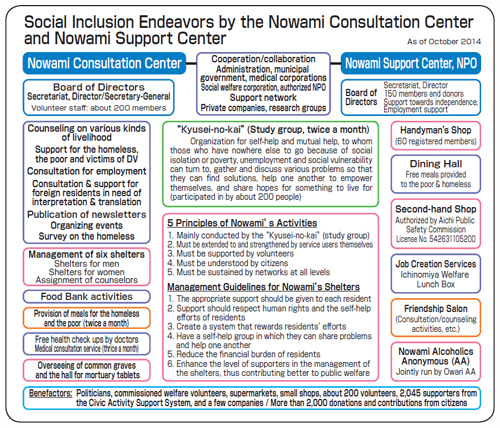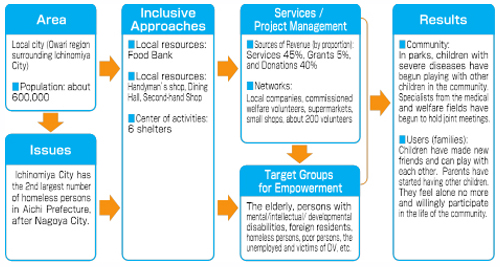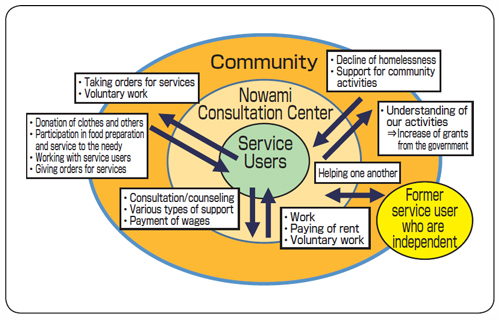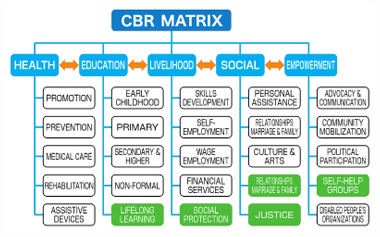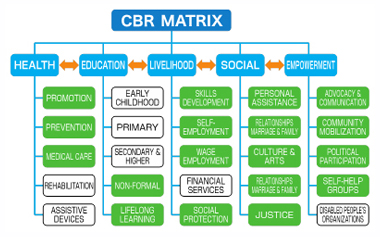Community-Based Inclusive Development
CBID Good Practices
Nowami Consultation Center
(Ichinomiya City, Aichi Prefecture)
Key Words Poverty, Learning
The Nowami Consultation Center is opened as an organization that upholds and respects human rights and fundamental freedoms espoused in the Universal Declaration of Human Rights. Center sees itself as an association upholding respect for basic human rights as stipulated in the Constitution of Japan, as well as promoting the International Covenant on Economic, Social and Cultural Rights. Through its activities, it especially aims to protect the rights of the socially vulnerable and the poor. Its activities will not only protect human rights but contribute to public welfare as well.
◆Background
In recent years there are an increasing number of people who lose their jobs due to social maladjustment, problems with human relationships, addiction to alcohol or gambling, and just not being able to stay employed. Being unable to pay rent, these people are evicted from apartments and many end up becoming homeless. There are also many cases where, with the changes of working environments, people have to work as temporary workers and later have no choice but to live on the streets.
◆Service Outline
To provide comprehensive support for every individual’s housing, food, clothing, places to go, job, and healthcare, it collaborates with the Nowami Support Center and try to provide accommodation, meals, daily necessities, the means to go places, job information, and how to receive public assistance. Since it believes that a place to sleep with peace of mind is most important for human life, its activities give first priority to housing.
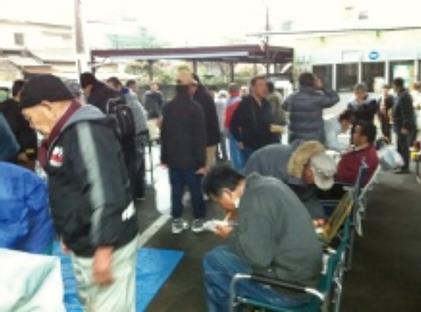
Providing meals for the homeless and the poor
Basic Data
●Coverage Area: The Owari region surrounding Ichinomiya City (small city)
●Population: About 600,000
●Issues: Ichinomiya City has the 2nd largest number of homeless persons in Aichi Prefecture, only after Nagoya City. According to a survey, there were 29 homeless persons as of September 2014.
■Year of Establishment
In 1998, the Nowami Consultation Center was created. In 2007, an office and cheap lodging house were opened in Ichinomiya City.
■Contents of Services
●Objectives: To contribute to public welfare by providing support to all the people who come for consultation.
●Purpose of Services and Target Groups: Elderly persons, persons with mental disabilities, persons with intellectual disabilities, persons with developmental disabilities, foreign residents, homeless people, the indigent, the unemployed, victims of domestic violence (DV), etc. About 3,000 people have been served.
●Stakeholders: Former service users living independently, community residents, disabled people’s organizations, commissoned welfare volunteers, local companies, and the municipal government.
●Main Source of Revenue: Sales from services (45%); grants (15%); and donations from individuals (40%)
●What We Have Implemented:
- Consultation for livelihood and employment, actual support to Japanese and foreign residents. (More than 1,000 cases per year)
- Support for the homeless and the poor, management of six (6) shelters (more than 140 cases a year)
- Preparation and serving of meals for the homeless and the poor twice a month, and management of self-help and study groups for the poor (about 60 participants)
- rovision of 50 meals at Dining Hall every day, employment support and provision of job information at the second-hand shops, and the handyman’s shop (More than 200 cases a year)
- Management of Nowami Alcoholics Anonymous (AA) in collaboration with Owari AA (twice a month for about 15 participants)
- Food Bank services, survey on the homeless, overseeing of common graves and the hall for mortuary tablets, and lunch box factory
- Lectures and piano recitals for fund raising
■Special Festures
Mr. Kenko Miwa, one of the founding members, used to conduct surveys on the homeless and distributed food to them himself since 1995. Later, with a help of a Christian organization, he started distributing old clothes, too, and with a Brazilian group started preparing and serving food in a park. He then set up the Nowami Consultation Center to provide support for the homeless and consultation services for foreign residents. In 2000, the homeless themselves built a shelter. Since 2006, in Ichinomiya City where most of the activities take place today, they started surveys on the homeless, prepared and distributed meals to them and other poor people, and the self-help group “Kyusei-no-kai” started conducting activities. In 2007, both the Consultation Center and the shelter moved to Ichinomiya City, and a shelter for women was created, too, to accommodate victims of domestic violence (DV).
Following the bankruptcy of Lehman Brothers in 2008, there were increasing cases of dismissed temporary workers and unstable employment, which led to a large number of unemployed persons. After our study group, “Kyusei-no-kai,” held several discussions, we set up the Nowami Support Center, an NPO, and opened Café Restaurant, Handyman’s Shop and Second-hand Shop, all of which are run by the service users themselves. In 2013, we also started Lunch Box Factory, which has created jobs for about 20 people.
In today’s Japan a growing number of people live a lonely life and die a solitary death.
After death occurs, issues, such as having no one to receive the ashes or look after the grave of the deceased, pose serious problems for the aged; and so in 2012, with the cooperation of a local temple, we built common graves and a hall for mortuary tablets with donations from the citizens. Having become free of worries after death, service users now have peace of mind and can now focus on living the present.
In fiscal year 2014, we put a great deal of effort in Food Bank activities jointly with Second Harvest Nagoya, which have enabled us to provide on a daily basis comprehensive support for housing, food, clothing, places to stay, employment, and health care.
Since we believe that going to sleep with peace of mind is very important for human life, we decided to build one shelter each year; and now we are operating 6 such shelters.
■“Kyusei-no-kai”
“Kyusei-no-kai” is a study group of service users. This is also a self-help group who places special importance to life after getting out of homelessness. They hold a lot of discussions as they share wisdom needed for survival, catch up on each other’s lives, and check their health and safety conditions. All the services that Nowami Consultation Center provides have been proposed by users through “Kyusei-no-kai,” approved by the board of directors, and then implemented. Through the learning gained in this study group, users begin to see other needs, think of solutions to the problems, and run the group by themselves, all of which help them to grow in their sense of responsibility.
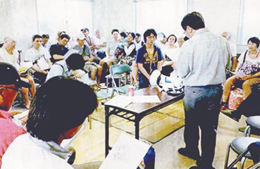
Activity at “Kyusei-no-kai”
■Community Network
Our Food Bank service closely collaborates with Second Harvest, an NPO that operates in the Owari region. Local supermarkets and food companies, too, offer us food for this project. Donated food is distributed to the poor and supplied to various welfare facilities/organizations and to community salons for the elderly upon request, which enables us to network with other organizations. We have been able to create a network with commissioned welfare volunteers for information exchange and mutual support. Local companies, too, have supported us in many ways, including job offers and financial contributions.
■Current Issues and Way Forward
Since there are many people wishing to stay at our shelters, we need to build more of them. As an increasing number of people stay at shelters for an extended period of time, we are considering the possibility of accommodation sharing, like group homes. Though we have been asking the local government to set up multi-purpose shelters, it has not materialized due to budgetary constraints. From 2015, we will start the Community Activity Support Center to provide persons with mental disabilities a place to be in during the day. Since there is no network among 9 centers similar to ours in the city, we hope to create one to collaborate with them. We also wish to extend our support to elderly persons living alone, children in poverty, foreign children not attending schools, and foreign residents with employment problems.
◆How Things Changed
Our service users mainly come to know us through referrals from the local government/other organizations, newspapers, TV, Internet, and referrals from their friends/advocates. At Dining Hall, we provide meals for the poor, which cost them a maximum of 200 yen a meal. But to make it easier for new homeless people to come, we also prepare and serve free meals in a park twice a month. Our former users voluntarily go around to find the homeless and approach them. We support our users in such a way that those who have received our support will be able to support others, after they have sorted out their own problems. For this purpose, we try to bring out the best out of our users while they are still receiving our support.
Many of our service users have not received proper education. Knowledge can give them power and strength, while the lack of understanding can do them harm. To improve their situation, “Kyusei-no-kai” study sessions are held twice a month. For those occasions, “Kyusei-no-kai News” is issued to help them catch up on each other. We believe that understanding each other’s problems will lead to self-help and mutual assistance. So far, various projects and services have been proposed through “Kyusei-no-kai,” and one of them became what is now the Nowami Consultation Center. repaired the shelter and even shared his expertise with others. Having seen this, neighbors and supporters started asking them to help with home renovations and weeding. Upon request, many shelter residents began to work together and receive money by painting and weeding. At “Kyusei-no-kai,” somebody suggested that they could start a handyman’s shop if they could have a truck. Thus, one of the board directors donated a truck, which then enabled users to help with moving houses and pick up discarded items. Since these items were starting to pile up, someone at “Kyusei-no-kai” said that they could open a second-hand shop. Later these ideas became a reality when both the Handyman’s Shop and the Second-hand Shop were started on the first floor of a newly built shelter.
In principle, our activities need to be understood by the community, and that is why we always try to use methods that appeal to people. With Ichinomiya City government’s Citizen Activity Support System, leaflets are delivered to every household, and since it bears our organization name, too, we are known as a trustworthy organization. Media coverage by TV and newspapers have also helped greatly as an increasing number of people in the community now support us by donating money and goods, volunteering help in our activities, and patronizing our services at home. Through the cooperation of organizations for persons with disabilities, we enhanced employment support, too. Commissioned welfare volunteers often play an important role in promoting our activities by bridging us with neighborhood associations. Out of concern, they sometimes refer cases to us. In such cases, we do ask them to deliver food to those families, which would come from the Food Bank or leftovers from our Lunch Box Factory.
●Ripple Effect(Project As a Model)
As our way of supporting poor people, we have built shelters and created places for “halfway employment” through which users can receive wages. By receiving donations in the form of daily necessities, users do not have to spend money on food or clothing, which enables them to save money while still staying at the shelters, which eventually helps them become independent.
With our method of providing support to empower users and to increase the sustainability of our services, the study group of users has played an important role in helping them acknowledge their challenges, propose the services they need, and implement those services with their own initiatives.
■Analysis Using the CBR Matrix
◆When Nowami Consultation Center was Created(around 1998)
Livelihood support was provided to the homeless, the poor and foreign residents.
◆Today
Comprehensive kinds of support are being provided to users with the view of supporting them even after achieving independence, as well as to people with all kinds of problems.

